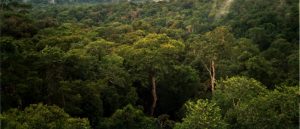The Spiritual and Ethical Limits of National Sovereignty When the Planet is Burning
A few months ago, Brazil’s President Jair Bolsonaro took refuge in a concept that may prove to be a dinosaur sooner rather than later: national sovereignty. When the leaders of world’s nations expressed alarm about the statistically abnormal rate the Amazon rain forest is burning this year, and offered financial assistance to battle the blazes, Bolsonaro angrily invoked the doctrine of national sovereignty. His retort to the concerned leaders of other nations: the portion of the Amazon that is within the borders of Brazil belongs to Brazil. Do not interfere with the nation’s economic development (rain forest is burned in order to cultivate cash crops). Or sovereignty.
But is national sovereignty a sufficiently apt concept to govern decisions about a planetary resource as important as the Amazon?
I’m asking about sufficiency because the 21st century—for better and for worse—is the most connected century of human existence thus far, and humankind has not evolved to make the world a better place in the matter of dealing with our diversity. (Which is not to say NOTHING is better in the world today. I highly recommend the late Hans Rosling’s book, Factfulness.)
True to the reptilian-primate part of our brains, we homo sapiens “other” others, which makes the multiplication of connections dangerous. We continue to create “in” and “out” groups, to divide “us” from “them,” to declare what is mine that you can’t have. The waxing of nationalism, and the waning of internationalism, are symptoms. America first. Italy first. Russia first. China first. Brazil first.
If we don’t do better with the opportunities to evolve as a human race than we are currently doing, our connectedness will be humankind’s, and maybe the biosphere’s, undoing. Climate weirding is bad and, by some measures, accelerating. The earth appears to be into the planet’s 6th mass extinction event. The 5th event, the result of an asteroid strike, ended the age of dinosaurs 65 million years ago. The 6th event is driven by homo sapiens. And recent studies have indicated that even climate scientists have become alarmed that their predictions regarding the impact of climate change under-estimated how quickly measures changed, for the worse.
(See this article on what the earth really needs from the Amazon.) The current controversy with Brazil and the Amazon shows the absurd limitation of national sovereignty in the face of potential catastrophe. While the Amazon is not truly “the lungs of the earth,” it is the home of a stunning amount of biodiversity, it absorbs much carbon dioxide and thus cools the planet, and fresh water—an increasingly scarce and valuable resource—is abundant.
The whole earth and all living things need the Amazon rain forest, as well as its cousins on other continents. Of course, the same “the whole earth needs” claim could be made for anything regarding the basic supports of life on earth: healthy soil, healthy oceans, fresh water, and clean air. Chemically toxic or dead soil, massive islands of plastic on the surface and micro-plastics at every level of the ocean’s depth, polluted/lead-laden water, and air despoiled by carbon fuel residues are threats to life. The threats are sometimes local. However, in a globalized planet rolling toward a cliff of human-driven climate change and a species-extinction event, threats are not contained within national borders. To apply Martin Luther King’s famous line about injustice: an environmental threat anywhere is a threat to the environment everywhere.
The doctrines of and related to national sovereignty will not disappear anytime soon. Internationalism appears to be waning. If the United Nations died tomorrow, one can’t imagine the leaders of today’s nations creating a replacement organization. But the doctrine of national sovereignty is too limited to serve in matters such as the continuing possibilities and potentials of life on the planet. We need another way of thinking to inform our practices and habits.
Within religious traditions, there is an understanding that human beings belong to the earth, rather than the other way around, and that a Creator gifted a life-giving world for humankind to till and to keep. In Christian circles, we talk about stewardship rather than ownership. Yes, some Christians talk domination rather than stewardship. And some limit stewardship to money, especially giving to the church.
Argh! What an awful distortion and diminishment of what could and should be a transformative understanding of what persons and nations are here to do.
Do you want to imagine a good life for your descendants, for your great-great-great grandchildren and their neighbors near and far? Then we had better see ourselves as stewards, taking care as we pass through this life, living gently, and urging our leaders to incorporate stewardship into our nation’s policies and practices.
If we don’t, then the equation is: America first + Brazil first + every other nation first = opting for death rather than life. And that is no way to live, period.



Comments are closed.